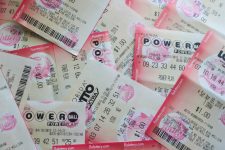 Last night the Mega Millions drawing worth an approximate 1.6 billion (yes billion with a B) was held. I couldn’t help but be intrigued by the subject and thought it would make an excellent article topic. Like in many other workplaces, what we would do if we won, has been the subject of conversations around the proverbial water cooler in our office.
Last night the Mega Millions drawing worth an approximate 1.6 billion (yes billion with a B) was held. I couldn’t help but be intrigued by the subject and thought it would make an excellent article topic. Like in many other workplaces, what we would do if we won, has been the subject of conversations around the proverbial water cooler in our office.
Since I have never purchased a lottery ticket, what it would be like if I won the lottery has rarely everentered my mind. I’m not morally opposed to the lottery, or think it’s some kind of great sin to play. I’vejust always thought it was a huge waste of money, and have never really had a desire to attain great wealth.
That’s why when the question was posed about what I would do if I won, I said I didn’t want to win. As crazy as that may sound, it is honestly how I feel. To be fair, if someone offered me a million dollars free and clear to shore up my retirement, and my kid’s college savings I’d take it in a heartbeat. But, getting a vast sum of money through Powerball or Mega Millions along with all the attention that comes with it, is an entirely different proposition.
After doing a little research for this article, my initial feelings about the potential danger of winning the lottery were validated. Unfortunately, attaining great wealth without attaining great wisdom first has led to many lives being destroyed and many fortunes being lost. William “Bud” Post is one of the most infamous of these stories. Within a year of him winning his multimillion dollar prize his life was ruined. He lost millions after he was sued by a former girlfriend, his brother hired a hit man to kill him as a way of speeding up his potential inheritance, and after other family members convinced him to sink a large sum of money into a business, he became alienated from the rest of his family. He lost it all, went into debt, and even spent time in prison. Sadly, he died penniless surviving on food stamps and a $450/month stipend.
Obviously, not everyone who wins the lottery experiences these kinds of troubles. But enough do that in his book, “Life Lessons from the Lottery” famed financial consultant, Don McNay, called winning “the curse of the lottery”, because it makes people’s lives worse instead of improving them. In fact, according to a study done by the National Endowment for Financial Education, about 70 percent of people who receive an unexpected windfall of cash like this end up losing it all within a few years.
With all that being said, lottery winners aren’t the only ones who unexpectedly come across vast sums of money. You or someone you know might come up with the next big invention, or you might discover a long lost relative has left you a huge inheritance. Maybe your child signs a lucrative recording contract, or gets drafted by the Chiefs. However it happens, without a plan, a blessing can quickly become a curse. That’s why we try to teach people the proper role of money in their lives every day. We believe money is a tool, if used properly it can bring great joy and satisfaction in your life. If used improperly it can bring terrible depression and pain.
The word Stewardship in Stewardship Capital is not just a catchy buzzword we use to help people remember us. It’s what hopefully drives every decision we make as a company. In the book of Mark Jesus taught that to whom much is given, much will be expected. I believe those who are able to show their ability to do right with the blessings God has already given them will naturally be given more. So, before developing your plan for what you will do if you’re suddenly blessed with millions, ask yourself, what you are doing with the blessings you have already been given.
(Past performance is no guarantee of future results. Advice is intended to be general in nature.)
